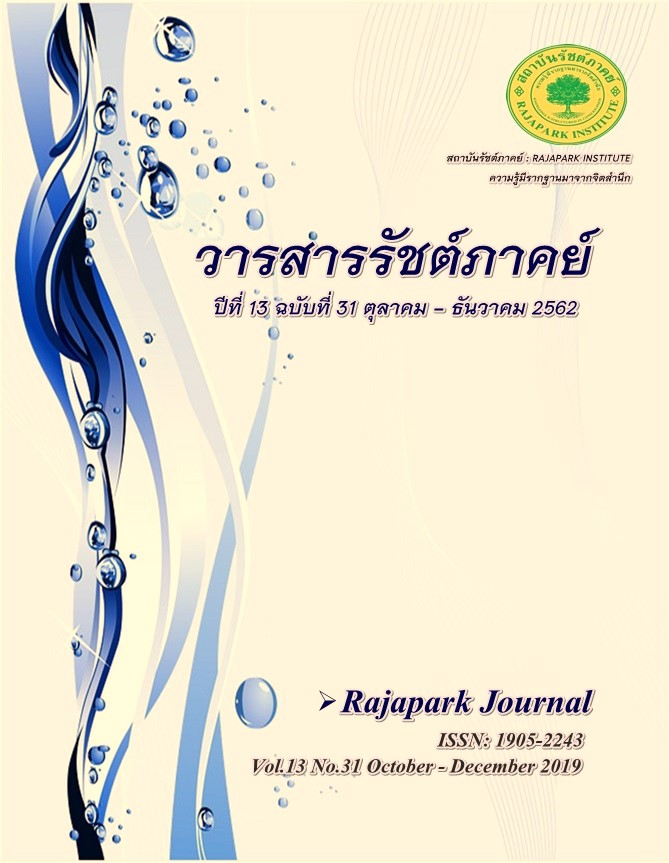The Effects of Group Logotherapy on Purpose in Life Among Drug Addicted Patients During Aftercare
Main Article Content
Abstract
This paper identifies the effectiveness of group logotherapy on purpose in life among drug-addicted patients during aftercare. An experimental with a randomized pretest-posttest control group design. The instruments used were the General information query, The Purpose in Life (PIL) test, Logotherapy group program. The research population consisted of drug-addicted outer patients during aftercare between the ages of seventeen and forty-five who were receiving drug addiction patients during aftercare between October 2017 and January 2018 at King Mongkut Memorial Hospital. Using the method of purposive sampling of 16 patients, the patients were randomly by assigned Using the method of purposive sampling of 16 patients, the patients were randomly by assigned into experimental and control groups, the researcher divided the members of the sample population into two groups of eight patients each. The experimental group received 8 sessions of group logotherapy, whereas in the control group did not attend sessions of group logotherapy. The data were analyzed by t-test for dependent samples and t-test for independent samples. The research result was as follow: The drug-addicted patients during aftercare who attended the group logotherapy program sessions exhibited a higher level of purpose in life than prior to having attended program sessions at the statistically significant and when compare the control group the reveal that the purpose in life of group in logotherapy program significantly higher than the control group at .01 level. Therefore, it could be concluded that group logotherapy is efficiently increasing purpose in life of drug-addicted patients during aftercare.
Article Details

This work is licensed under a Creative Commons Attribution-NonCommercial-NoDerivatives 4.0 International License.
Views and opinions appearing in the Journal it is the responsibility of the author of the article, and does not constitute the view and responsibility of the editorial team.
References
Bronk, K. C., Hill, P. L., Lapsley, D. K., Talib, T. L. & Finch, H. (2009). Purpose, hope, and life satisfaction in three age groups. The Journal of Positive Psychology, 4(6), 500-510.
Chainakin, C. (2016). Cessation of repeated amphetamine addiction: A case study of rehabilitated persons in a behavior modification camp by the therapeutic community method. Kuakarun Journal of Nursing, 2(23), 248-262.
Chayutasahakit, N. (2014). Family support, meaning in life, and wellness among juvenile delinquents with substance abuse: A mixed methods study. Master's thesis, Chulalongkorn University.
Cooper, M. (2003). Existential therapies. London: SAGE.
Emavarallhana, T. (2004). Counseling Psychology for Drug Addicts. (2nd Ed). Bangkok: Thammasat Printing House.
Frankl, V. E. (1984). Man’s search for meaning (Rev. ed.). NY: Washington Square Press.
Frankl, V. E. (1988). The will to meaning: Foundations and applications of logotherapy. Retrieved April 10, 2018, from https://play.google.com/books/reader/
Frankl, V. E. (2006). Man’s search for meaning. (Thepvijit, O., Trans.). (2nd ed.). Bangkok: OMG.
Lawanna, S. (2000). The effects of logotherapy and value clarification activities on future-oriented characteristics of female youths at the observation and protection center in Nakornratchasima province. Master's thesis, Burapha University.
Losuya, W. (2007). The effect of logotherapy group counseling on changing the drinking behavior of alcoholic patients at Phramongkutklao Hospital. Master's thesis, Thammasat University.
Malarot, P. (2017). Freelance: Freedom of will and meaning of life. Master's thesis, Chiang Mai University.
Ministry of Public Health, Office of the Permanent Secretary. (2016). Guidelines for drug operations, Ministry of Public Health. Nonthaburi: Author.
Moein, L., & Haushyar, F. (2015). The Effect of Logotherapy on Improving Self-Esteem and Adjustment in Physically Disabled People. GESJ: Education Science and Psychology, 5, 3-13.
Mohamad, K., Masood, Y., & Hemn, M. (2014). Effect of group logotherapy in reducing depression and increasing hope in drug addicts. Journal of Research & Health, 6, 167-174.
Office of the Narcotics Control Board. (2017). Strategic plan—Prevention and solution of drug problems 2017-2019. Bangkok: Author.
Okan, N., & Eksi, H. (2017). Spirituality in Logotherapy. Spiritual psychology and counseling. Retrieved April 10, 2018, from https://dx.doi.org/10.12738/spc.2017.2.0028
Panya, S. (2017, July). Study on the risk factors for repeated drug addiction among drug addiction patients at a drug addiction rehabilitation center in the Northeast. The 2nd National Conference Ubon Ratchathani: 4.0 Research for the development of the country towards stability, prosperity, and sustainability at Ratchathani University, Ubonratchathani.
Pattrakorn, A. & Chaipichitpan, N. (2015). The effect of the FAST model for addiction patients at Thanyarak Institute. J Psychiatr Assoc Thailand, 1(60), 71-81.
Pongsopar, P., & Pongsopar, W. (2014). Theories and Techniques of Counseling. Bangkok: Chulalongkorn University.
Schaefer, S. M., Boylan, J. M., Reekum, C. M., Lapate, R. C., Norris, C. J., Ryff, C. D., et al. (2013). Purpose in Life Predicts Better Emotional Recovery from Negative Stimuli. Plos One, 8(11), 1-9.
Suwanphahu, B. (2016). Applying logotherapy to enhance the wellness of young delinquents with drug abuse. Doctoral dissertation, Chulalongkorn University.
Tuicomepee, A. (1993). Effects of logotherapy group on increasing purpose in life of woman with high-risk behavior for HIV positive in Kredtrakarn Home. Master's thesis, Chulalongkorn University.
Tuicomepee, A. (2016). Logotherapy. (4th ed.). Bangkok: Chulalongkorn University.
Thatsananchalee, P. (2011). The process of non becoming amphetamine addict: A case study of rehabilitated person in process of correctional system. Interdisciplinary Sripatum Chonburi Journal, 2(8), 36-48.


